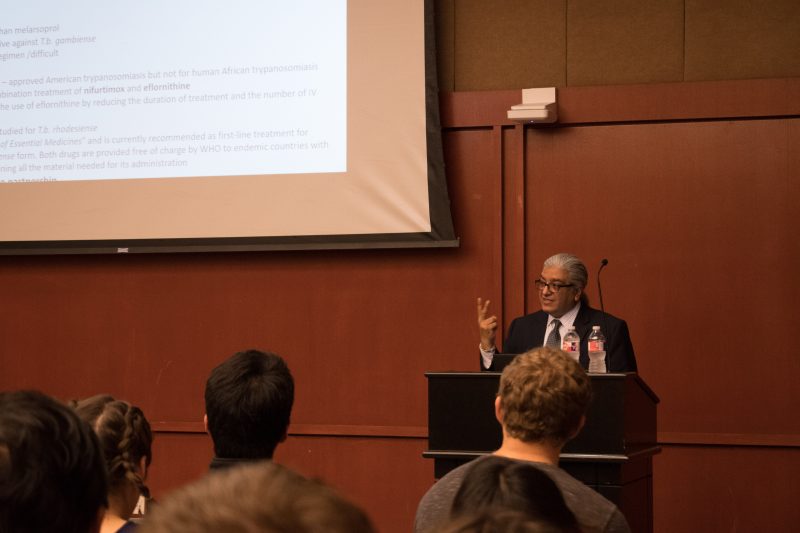Trinity’s Global Health Initiative (GHI) welcomed Fareed Mahmood Khan, associate professor at the Baylor College of Medicine, to campus to discuss prominent tropical diseases that are classified as neglected by the United States.
Last Thursday, Feb. 22, Khan refuted the claim that the diseases are forgotten, but did concede that the U.S. is not doing enough to eradicate these diseases to a crowd of about 50 people in the Fiesta Room.
“Dr. Khan has accomplished a lot in his lifetime. He is not only a family medicine doctor at Baylor College of Medicine, but he is also in a three-year elected term as senator at large at the medical school,” said junior Emmanuella Oduguwa, president of GHI. “He also runs a non profit organization in Honduras. It is called Shoulder to Shoulder, and this organization has helped to construct a health clinic in rural Honduras. He has also received a certificate in tropical medicine.”
The diseases Khan focused on are those that are non-viral and that are treatable, but that either damage the host severely or can kill them. These diseases are often very prominent in poor populations in Africa, South America and Asia.
The diseases, such as hookworm, dracunculus and Ebola, are very old and have existed within these civilizations for centuries. According to Khan, one seventh of the world’s population is affected by these diseases.
“The U.S. is undergoing a very introspective sort of view of the world — all the money that we were necessarily wanting to put towards diseases out there in the world. Now suddenly a lot of programs have been cut,” Khan said. “[The U.S.] is actually moving away and neglecting more, although I contend that these are not forgotten diseases or forgotten people.”
Khan goes on to argue that the medical world is not necessarily seeking to eradicate diseases, which may prevent the creation of vaccines. Rather, the goal is to minimize the morbidity of these diseases using solutions developed in areas local to the disease.
“Never a single approach and always local. You think you can sit in Silicon Valley and think of a solution? You are wrong,” Khan said. “The application [of a solution] has to be locally done, locally driven, and that’s where it counts.”
Khan discussed several measures, including preventative chemotherapy: A drug is distributed to the targeted community, which either treats the disease or prevents its spread. Additionally, teachers show civilians how to deal with an infection without medical assistance, like guinea-worm, which can be fought with cleanliness and rolling the worm out.
Khan’s lecture focused more on the social justice issues linked with his research rather than specific scientific data.
“From this lecture I learned how we can actually incorporate social change, long-term change,” said Josh Lee, sophomore. “He’s emphasizing the fact that the states are neglecting these diseases because they’re not happening here, but we do realize that it’s a big issue out in other countries.”
Khan hoped that spreading awareness of these issues in the U.S. will prompt life-saving solutions.







